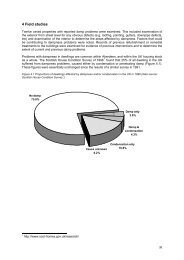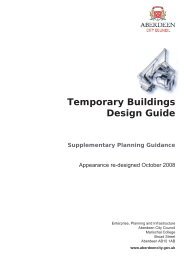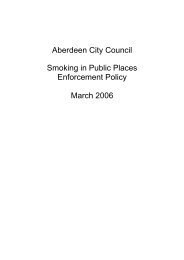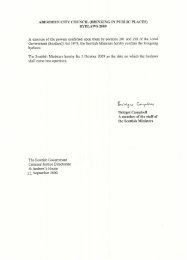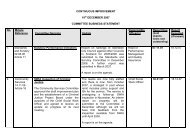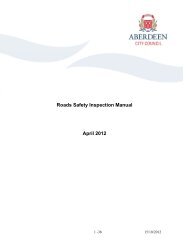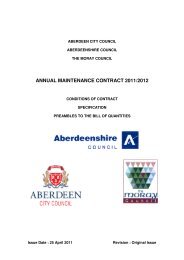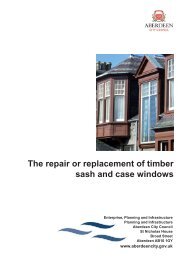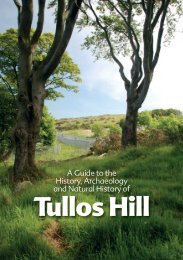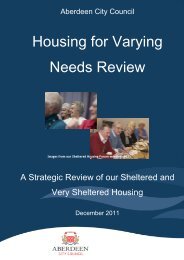he concept of the Burgess oath belongs - Aberdeen City Council
he concept of the Burgess oath belongs - Aberdeen City Council
he concept of the Burgess oath belongs - Aberdeen City Council
- No tags were found...
You also want an ePaper? Increase the reach of your titles
YUMPU automatically turns print PDFs into web optimized ePapers that Google loves.
In 1597, t<strong>he</strong> Dean was required tosupervise t<strong>he</strong> burning <strong>of</strong> a number <strong>of</strong>witc<strong>he</strong>s as well as t<strong>he</strong> execution <strong>of</strong> fourpirates. In t<strong>he</strong> same year <strong>he</strong> had tooversee t<strong>he</strong> rebuilding <strong>of</strong> part <strong>of</strong> t<strong>he</strong>Town House and was paid a specialallowance for carrying out t<strong>he</strong>se tasks.Above all, it was t<strong>he</strong> duty <strong>of</strong> t<strong>he</strong> Dean tocarry out t<strong>he</strong> instructions <strong>of</strong> t<strong>he</strong>magistrates and <strong>Council</strong>.It was about this time that t<strong>he</strong> Dean <strong>of</strong>Guild was empowered by statute toexercise t<strong>he</strong> authority <strong>of</strong> a judge indisputes between merchants and alsobetween merchants and mariners. Witht<strong>he</strong> assistance <strong>of</strong> his Assessors,appointed by a Town <strong>Council</strong> somewhatjealous <strong>of</strong> this extension to t<strong>he</strong> Dean’spower and authority, <strong>he</strong> could decide insuch cases in a summary manner.However, <strong>he</strong> never possessed t<strong>he</strong> power<strong>of</strong> judging any case with regard toproperty within t<strong>he</strong> burgh, and t<strong>he</strong>re wasnever a Dean <strong>of</strong> Guild Court, ascommonly understood in Scotland, in<strong>Aberdeen</strong>.T<strong>he</strong> charter granted by Charles I to t<strong>he</strong>burgh in 1638 specifically mentioned t<strong>he</strong>responsibility <strong>of</strong> t<strong>he</strong> Dean <strong>of</strong> Guild formaintaining t<strong>he</strong> standard weights andmeasures - a service absolutely vital tot<strong>he</strong> population. An inspector <strong>of</strong> weightsand measures, a paid <strong>of</strong>ficer <strong>of</strong> t<strong>he</strong> Town<strong>Council</strong>, was appointed for this task int<strong>he</strong> 19th Century.T<strong>he</strong> Dean’s duties down t<strong>he</strong> years wereindeed varied. In 1774, for example, <strong>he</strong>was responsible for estimating t<strong>he</strong> cost<strong>of</strong> keeping t<strong>he</strong> streets in repair andlighting, toget<strong>he</strong>r with t<strong>he</strong> cost <strong>of</strong>supplying water to t<strong>he</strong> burgh - and all atan assessment <strong>of</strong> one shilling in t<strong>he</strong>pound <strong>of</strong> house rents.Dean <strong>of</strong> Guild Accounts for burning witc<strong>he</strong>s 1597T<strong>he</strong> Royal Burghs Reform Act <strong>of</strong> 1833brought a number <strong>of</strong> changes involvingt<strong>he</strong> Dean. Under it <strong>he</strong> was elected by his<strong>Burgess</strong>es <strong>of</strong> Guild as t<strong>he</strong> nineteenthmember <strong>of</strong> t<strong>he</strong> Town <strong>Council</strong> to sit ast<strong>he</strong>ir representative. Over t<strong>he</strong> nextcentury several Deans <strong>of</strong> Guild went onto serve as Provost, demonstrating thatt<strong>he</strong> Dean’s position remained asignificant one in local politics.Ot<strong>he</strong>r outcomes <strong>of</strong> t<strong>he</strong> 1833 Act wereless <strong>he</strong>lpful to t<strong>he</strong> Guildry. No longercould t<strong>he</strong> Dean call upon t<strong>he</strong> resources<strong>of</strong> manpower and finance which hadbeen his as an <strong>of</strong>fice-bearer <strong>of</strong> t<strong>he</strong><strong>Council</strong>.While t<strong>he</strong> Act did not change t<strong>he</strong>relationship between Guildrymembership and t<strong>he</strong> exercise <strong>of</strong> tradingprivileges, t<strong>he</strong> spirit <strong>of</strong> t<strong>he</strong> age waseffectively undermining a situationw<strong>he</strong>re, throughout Scotland, smallgroups <strong>of</strong> individuals could claim tocontrol t<strong>he</strong> wholesale and retail trade <strong>of</strong>t<strong>he</strong>ir locality.T<strong>he</strong> monopoly on trade had beeneroding since t<strong>he</strong> late 18th Century andin 1846, on t<strong>he</strong> recommendation <strong>of</strong> t<strong>he</strong>Dean <strong>of</strong> Guild, t<strong>he</strong> Guildry <strong>of</strong>fered noopposition to t<strong>he</strong> proposal to abolish t<strong>he</strong>right <strong>of</strong> exclusive trading by t<strong>he</strong>



